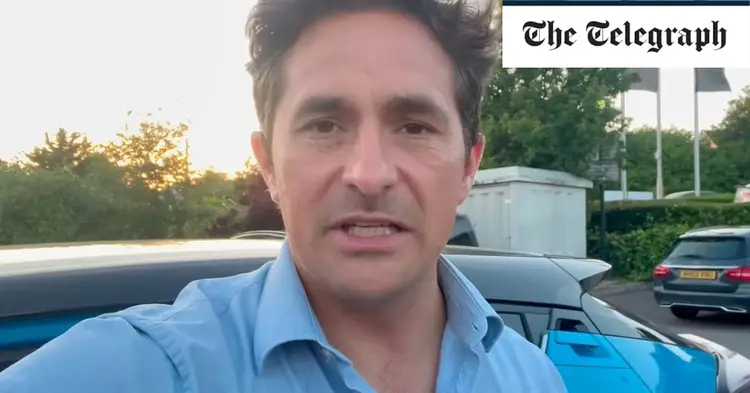Johnny Mercer: Why I called out my Labour rival

In general, hustings can be uncomfortable events. They are often not well attended and rarely do they sway the opinions of voters, since candidates typically stick to scripted statements provided by their local party headquarters. However, during the chaos of the hustings in Plymouth on Thursday night, I couldn't help but sit back and absorb the unexpected turn of events.
Even though he greeted me warmly and praised my work, admitting that he and his friends had purchased my book about Royal Marines Young Officer Training and expressing that it was an honor to meet me, my current Labour opponent was subjected to aggressive and disrespectful behavior that made me uneasy.
"You're a shame! You're revolting!" they yelled at him; it's all recorded if you want to hear it. But as I glanced down the row beyond a woman screaming, I noticed an older man, sitting calmly, but becoming visibly upset.
I immediately knew what was happening. The individual encounter that can make situations like this especially difficult. The emotional wounds from serving in combat – taking lives and losing friends, giving everything for their country.
I thought I was accustomed to the chaos of being in the public eye. However, when I looked at him, I recognized the same emotions stirring within me. The intense anger of someone deceitfully claiming military experience in the presence of individuals who have actually experienced the horrors of war in places like Kosovo, the Falklands, Northern Ireland, Iraq, and Afghanistan.
And then it all changed. I gazed at the older man, realizing that this was a crucial moment to determine my purpose. It reminded me of when I witnessed Dennis Hutchings in a Belfast courtroom, or encountered Soldier A, Soldier C, and all the other individuals I have supported.
The Labour candidate proudly talked about his time in the military, specifically mentioning his involvement in combat missions during an interview with the Guardian. He has been consistently sharing this article, making it a prominent feature on his website alongside another piece that labels him as a "War Hero". Despite the opportunity to retract or clarify this claim, he chose to continue promoting it, clearly wanting others to believe it.
Based on the length of his service and the specific unit he belonged to, it was clear that his claim was not believable. A benefit of having a relatively small UK military is that most people have connections and can quickly debunk false statements. It was evidently false.
"Not Something To Boast About"
I sent him a nice message saying that his statement was quite bold for someone from his generation, especially considering that some of his colleagues went through intense combat in Afghanistan, comparable to the Korean War. I mentioned that this topic might come up and asked if he could assist me in addressing any difficult questions about it. He informed me that the Labour Party had instructed him not to discuss it. Once again, I didn't believe this excuse.
He faced consequences this week, and has finally acknowledged that the Guardian misinterpreted the interview. He believes it was their mistake, not his. The experience was tough to witness and even tougher to go through.
Many of us avoid discussing this topic with good cause. I experienced a dangerous situation when I was crossing a road during combat and a Taliban soldier fired at me and a companion from 80 meters away using a powerful machine gun. Sadly, my friend was hit in the face and passed away instantly, but I miraculously emerged unharmed. It was nothing but sheer luck that determined our fates that day.
I often ponder this question. Why was he chosen instead of me? Holding his lifeless body, feeling the transition from warm to cold, I couldn't help but think of his mother and the dreams he had given up for his country, dreams that would never come to fruition. It's not something you proudly share; it's something you push to the back of your mind. The feeling of guilt can be consuming, and imposter syndrome stays with you for years, unexpectedly surfacing like a blow from a boxer when you least expect it. I remember breaking down in tears on my wedding day, overwhelmed by these feelings.
After the chaos calmed down at the public meeting place, I approached an older man to have a conversation. He shared with me his experience of being on a boat that went down during the Falklands War. Although my emotions were high at that moment, I vaguely recall him saying, "I can't bear to witness these things anymore, Johnny."
I don't engage in these activities for the media critics or for the large audiences. My focus is on the overlooked veterans who have been let down by their country, those who silently bear the aftermath of their experiences, or have their heroic service diminished by others for their own benefit. It is truly upsetting and disrespectful to those who have made the ultimate sacrifice in combat.
I used to be against punishing people who exaggerate or pretend to be someone they're not. I thought they were just a group of sad individuals who needed support, not punishment. However, after this week, my opinion has completely shifted. It is deceitful and, at the very least, attempted fraud. I will work hard to ensure that any future government takes action against this behavior.













































